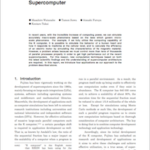In this sponsored post from our friends over at Quanta Cloud Technology (QCT), review how QCT brings out the concept called QCT Platform on Demand (QCT POD), which is a converged framework with a flexible infrastructure for customers running different workloads. Under this concept, QCT develops the QCT POD for Medical (QPM) that is an on-premise rack-level system with common building blocks designed to provide greater flexibility and scalability, aimed to meet different medical workload demands using HPC and DL technologies, including Next Generation Sequencing (NGS), Molecular Dynamics (MD), and Medical Image Recognition.
Research for New Technology Using Supercomputers
This paper presents our approach to research and development in relation to four applications in which utilization of simulations in super-large-scale computation systems is expected to serve useful purposes.
Dell HPC General Research Computing
This white paper provides information on the latest Dell HPC General Research Computing Solution based on the Dell 13th Generation servers. The solution supports new generation Intel Xeon E5-2600 v3 based PowerEdge servers targeted to provide optimal performance and dense compute power.
insideBIGDATA Guide to Scientific Research
Daniel Gutierrez, Managing Editor, of insideBIGDATA has put together a terrific Guide to Scientific Research. The goal of this paper is to provide a road map for scientific researchers wishing to capitalize on the rapid growth of big data technology for collecting, transforming, analyzing, and visualizing large scientific data sets.
How HPC is increasing speed and accuracy
The overwhelming task of high performance computing today is the processing of huge amounts of data quickly and accurately. Just adding greater numbers of more intensive, sophisticated servers only partially solves the problem.
Report: Sequester Hurting American Research
A new report shows that the American research community is already experiencing extreme setbacks as a result of sequestration. Produced by the American Society for Biochemistry and Molecular Biology along with 15 other science organizations, the report is based on a nationwide, online survey designed to measure the effects of the faltering federal investment on scientists and the research they are trying to conduct.









